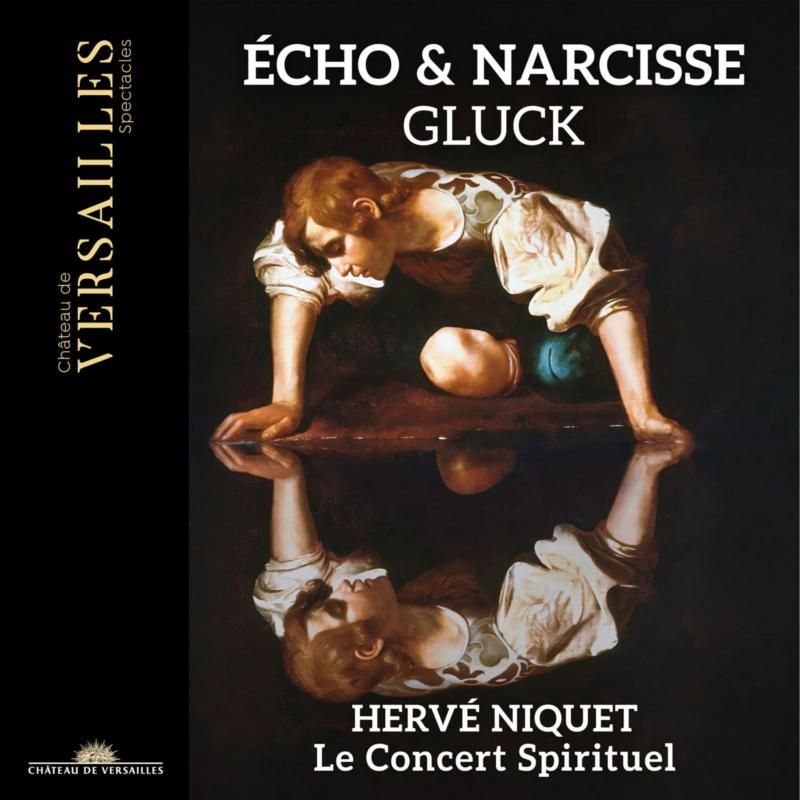GLUCK Écho et Narcisse (Niquet)
View record and artist detailsRecord and Artist Details
Genre:
Opera
Label: Château de Versailles Spectacles
Magazine Review Date: 11/2023
Media Format: CD or Download
Media Runtime: 102
Mastering:
DDD
Catalogue Number: CVS095

Tracks:
| Composition | Artist Credit |
|---|---|
| Echo et Narcisse |
Christoph Gluck, Composer
(Le) Concert Spirituel Chorus Adèle Carlier, Aglaé, Soprano Adriana Gonzalez, Écho, Soprano Cecile Achille, Églé, Soprano Cyrille Dubois, Narcisse, Tenor Hervé Niquet, Conductor Laura Jarrell, Thanais, Soprano Lucie Edel, Sylphie, Mezzo soprano Myriam Leblanc, Amour, Soprano Sahy Ratia, Cynire, Tenor |
Author: David Vickers
Écho et Narcisse (1779) was Gluck’s sixth tragédie lyrique for Paris. Produced just four months after the first run of Iphigénie en Tauride, it managed only a dozen poorly attended performances. The disappointed Gluck returned to Vienna, and, as it turned out, never composed another opera. Unlike classical or Tasso-inspired topoi in Gluck’s other French music dramas of the 1770s, Baron Louis-Théodore de Tschudi’s libretto is a pastoral entertainment that recounts the turmoil of the lovers Echo and Narcissus, whose Ovidian tragedy metamorphoses here into a happy ending thanks to Cupid’s intervention. The simple plot is prolonged by all manner of contrived interactions with the companions Aglaé, Églé, Cynire, Uncle Tom Cobley and all. Gluck’s score features charming and inventive music – with prominent use of clarinets (and other woodwinds) and, aptly, echo effects.
The opera has not flourished in modern times either. A production at Schwetzingen in 1987 was recorded live by Concerto Köln and René Jacobs (Harmonia Mundi, 11/88), but it has long been out of print. Château de Versailles Spectacles now presents the opera’s long-overdue second recording, made in October 2022. The booklet contains plenty of eye-catching illustrations of the myth of Echo and Narcissus, Hervé Niquet’s short note and Benoît Dratwicki’s illuminating essay, but the synopsis is far too perfunctory and the libretto omits (often essential) stage directions and scene descriptions.
Manifold details in Gluck’s balletic Overture are brought to life by Le Concert Spirituel’s swaying sensuousness. In the prologue a chorus of Pleasures ought to have sounded offstage before temple doors open to reveal Cupid on a bed of roses (Myriam Leblanc’s mirthful Cupid has lightly boyish tone). Sparkling singing from Adèle Carlier (Aglaé) and Cécile Achille (Églé) invites sylvans and dryads to celebrate Narcissus and Echo’s wedding day in Act 1; contrasting pastoral dances quickly ensue, and also braying horn fanfares in an air marqué. Adriana González’s dark-hued and solemnly rhetorical singing is well suited to Echo’s uneasy suspicion that Narcissus no longer loves her. She does not realise that Narcissus has been cursed by Apollo to see a beautiful water goddess in his own reflection – an action depicted in his entrance ‘Divinité des eaux’, sung mellifluously by Cyrille Dubois. Gluck’s clever music conveys Echo oscillating between inconsolable lamentation and agitation as she loses the desire to live.
Echo’s friends try to revive her in a radiant Act 2 quartet for four sopranos (‘Ô chère et tendre amie’). Her expiring words that she has been poisoned to death by grief provokes a chorus of intense sorrow (‘Ô mortelles alarmes’) that is not a million miles away from the opening of Orfeo ed Euridice (Gluck uses trombones here, too, albeit more subdued in their function). Apollo releases the curse just in time for Narcissus to hear (and respond to) the processional funeral chorus; the choir does not sound sufficiently offstage behind the mausoleum’s closed doors, so Dubois and Sahy Ratia (Cynire) have to fight for their comments to be heard, but Narcissus’s horn-fuelled horrified reaction as the curtain falls has visceral theatricality.
In Act 3 there is vivid dramatic writing in the depiction of Narcissus’s unassuageable guilt and heartbreak (‘Beaux lieux, témoins de mon ardeur’) as he prepares to stab himself. He stops when he hears Echo’s voice calling for him – a couple of her phrases are literal echoes of the last words of Narcissus’s sentences. She has been resurrected by Cupid, who joins them together before joyful choruses and dances. Refreshingly devoid of mercurial impulses, Niquet’s well-judged performance should go some way towards rehabilitating the reputation of Gluck’s final opera.
Discover the world's largest classical music catalogue with Presto Music.

Gramophone Digital Club
- Digital Edition
- Digital Archive
- Reviews Database
- Full website access
From £8.75 / month
Subscribe
Gramophone Full Club
- Print Edition
- Digital Edition
- Digital Archive
- Reviews Database
- Full website access
From £11.00 / month
Subscribe
If you are a library, university or other organisation that would be interested in an institutional subscription to Gramophone please click here for further information.




